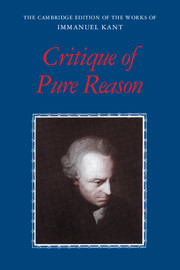Book contents
- Frontmatter
- Contents
- General editors' preface
- Acknowledgments
- Introduction
- Immanuel Kant, Critique of Pure Reason
- I Transcendental doctrine of elements
- Division one. Transcendental analytic
- Book I Analytic of concepts
- Book II Analytic of principles
- Chapter I On the schematism of pure concepts of the understanding
- Chapter II System of all principles of pure understanding
- Chapter III On the ground of the distinction of all objects in general into phenomena and noumena (as in the first edition)
- Chapter III On the ground of the distinction of all objects in general into phenomena and noumena (as in the second edition)
- Appendix: On the amphiboly of concepts of reflection
- Remark to the amphiboly of concepts of reflection
- Division two. Transcendental dialectic
- II Transcendental doctrine of method
- Editorial Notes
- Glossary
- Index
Chapter II - System of all principles of pure understanding
from Book II - Analytic of principles
Published online by Cambridge University Press: 05 July 2013
- Frontmatter
- Contents
- General editors' preface
- Acknowledgments
- Introduction
- Immanuel Kant, Critique of Pure Reason
- I Transcendental doctrine of elements
- Division one. Transcendental analytic
- Book I Analytic of concepts
- Book II Analytic of principles
- Chapter I On the schematism of pure concepts of the understanding
- Chapter II System of all principles of pure understanding
- Chapter III On the ground of the distinction of all objects in general into phenomena and noumena (as in the first edition)
- Chapter III On the ground of the distinction of all objects in general into phenomena and noumena (as in the second edition)
- Appendix: On the amphiboly of concepts of reflection
- Remark to the amphiboly of concepts of reflection
- Division two. Transcendental dialectic
- II Transcendental doctrine of method
- Editorial Notes
- Glossary
- Index
Summary
In the previous chapter we have considered the transcendental power of judgment only in accordance with the general conditions under which alone it is authorized to use the pure concepts of the understanding for synthetic judgments. Now our task is to exhibit in systematic combination the judgments that the understanding actually brings about a priori subject to this critical warning, for which our table of the categories must doubtless give us natural and secure guidance. For it is precisely these whose relation to possible experience must constitute all pure cognition of the understanding a priori , and whose relation' to sensibility in general will, on that very account, display all transcendental principles of the use of the understanding completely and in a system.
A priori principles bear this name not merely because they contain in themselves the grounds of other judgments, but also because they are not themselves grounded in higher and more general cognitions. Yet this property does not elevate them beyond all proof. For although this could not be carried further objectively, but rather grounds all cognition of its object, yet this does not prevent a proof from the subjective sources of the possibility of a cognition of an object in general from being possible, indeed even necessary, since otherwise the proposition would raise the greatest suspicion of being a merely surreptitious assertion.
- Type
- Chapter
- Information
- Critique of Pure Reason , pp. 278 - 337Publisher: Cambridge University PressPrint publication year: 1998

